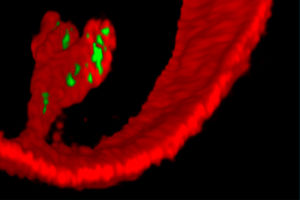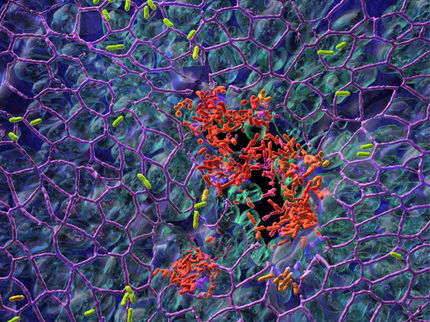Zipper Triggers Bacterial Invasion
Researchers discover new strategy germs use to invade cells
Advertisement
The hospital germ Pseudomonas aeruginosa wraps itself into the membrane of human cells: A team led by Dr. Thorsten Eierhoff and Junior Professor Dr. Winfried Römer from the Institute of Biology II, members of the Cluster of Excellence BIOSS Centre for Biological Signalling Studies of the University of Freiburg, has identified a novel mechanism of bacterial invasion: Pseudomonas aeruginosa uses lipids in the cell membrane to make its way into host cells. The protein LecA on the surface of the bacteria binds to sugar on special lipid molecules, so-called Gb3 lipids, which are present in the outer membrane of human cells. When the germ docks onto a cell, the LecA molecules of the bacteria and the Gb3 lipids of the host membrane interlock – like a zipper. In this way, the cell envelope wraps itself around the germ step by step and conveys it into the cell’s interior. Römer and Eierhoff found evidence of the new mechanism in synthetic membranes as well as in cultures of human lung cells. They published their findings in the journal Proceedings of the National Academy of Sciences.

Pseudomonas aeruginosa (green) invades a synthetic vesicle (red) using the lipid zipper.
Thorsten Eierhoff
Pseudomonas aeruginosa can cause serious inflammations of the skin and the lung in patients with a weakened immune system, particularly in those suffering from the genetic disorder cystic fibrosis. When the bacteria enter human cells, Gb3 lipids bind to LecA proteins and bend the membrane. This bond is enough to wrap up the bacterium, calculated Prof. Dr. Christian Fleck from Wageningen University, Netherlands. He was co-author of this study. Researchers were previously only familiar with methods of bacterial invasion involving the manipulation of signals in the host cell. These signals control actin fibers, the cell’s muscles: The fibers bend the cell envelope from inside and form membrane bubbles into which the bacteria are absorbed.
In order to prove that the process runs without actin, the researchers observed the effect of Pseudomonas bacteria on synthetic membrane bubbles. The bubbles contained neither actin nor other cellular components – only the lipid Gb3. The in vitro membrane folded in and closed in around the bacteria when they docked onto the surface. However, the wrapping process only took place when the bacteria produced the protein LecA. “The experiment shows that Pseudomonas uses this lipid zipper to make its way into cells without manipulating actin,” says Eierhoff. The researchers demonstrated that LecA and Gb3 are also important for bacterial invasion in human lung cells: When the pair of molecules was missing, the number of germs that infiltrated the cells was reduced by up to 70 percent. These findings enabled Römer’s research group to identify a potential agent against Pseudomonas aeroginosa.




















































